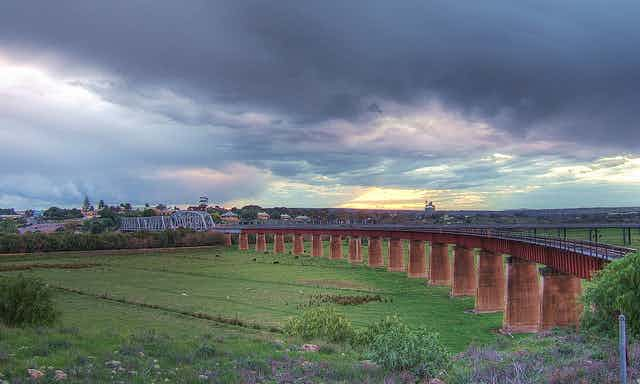Sharing water between different groups in society is almost inevitably a very contentious issue. Throughout the world, there are daily conflicts between people about how water can be used; at an individual level between neighbouring land holders, between communities and even countries.
To address these conflicts, a solution has to be found to enable users (including the environment itself), to have access to the water resources they require both for basic survival, and for economic growth. If this does not happen, then inevitably, conflicts occur.
As human populations have risen, and the use of water has become more explicitly tied to economic development, the matter has become more urgent, resulting in greater potential for conflict.
Sharing available water is made worse these days as a result of the likely impacts of climate change. This is the situation currently arising in many river basins across the world, including the Murray-Darling Basin and other rivers in Australia.
In a global study on Rivers in Crisis, published in Nature in 2010, the Murray-Darling Basin was the only river system on the continent of Australia that exhibited crisis-level exposure to the combined effects of pollution, water regulation, flood plain fragmentation and other threats, as illustrated in figure 1.

There is no doubt irrigated agriculture is important in the basin. Farming production systems provide core employment and income support across the whole of Australia. Farmers in the basin provide a vital contribution to food security, not just nationally, but in the region more widely.
Nevertheless, it has long been recognised that water use in agriculture is often not the most efficient use. There is much scope to significantly improve agricultural water use efficiency, with innovative technology, changes in crop choices, and the implementation of market-based instruments to support behavioural change.
According to the Global Water Partnership (GWP), a body set up to support and promote Integrated Water Resources Management, water governance is the “range of political, social, economic and administrative systems that are in place to develop and manage water resources, and the delivery of water services”. From the political point of view, governance determines what objectives and values are pertinent, and how they are achieved. Determining appropriate and acceptable objectives and values can be achieved by bringing together the scientific and technological community with social actors across the basin.
In reality, political processes are essentially about exercising power, and are often characterised by ongoing confrontation between rival political actors. Governance and citizenship are essential components of these wider political processes, and achieving consensus and fostering cooperation about the political decisions and institutional arrangements cannot be done in isolation from these conflicting views.
The use of concepts such as governance, citizenship or civil society presupposes the existence of a shared understanding. But the meaning of these concepts is both historically determined and subject to political and socio-cultural realities. Across the basin, perhaps a shared understanding is now beginning to evolve.
The Murray-Darling Basin has long been held up as an example of good practice in river management. Experts from river authorities across the world regularly come to the basin to learn from us. Over the last few years, efforts to achieve a more equitable and representative understanding of the values of water systems have been made in the Murray-Darling Basin, and gradually progress is being made.
If we can steer water policy through the treacherous waters of competing uses in multifunctional systems, our efforts to achieve ecological, social and economic sustainability will be a more reachable goal. The decision made yesterday to increase water allocation to support river integrity itself, is an excellent signal to the people of Australia that our core ecosystems do matter.
For once, as we move a little closer to a shared consensus, let us applaud the fact that the voice of the river itself is finally being heard!

